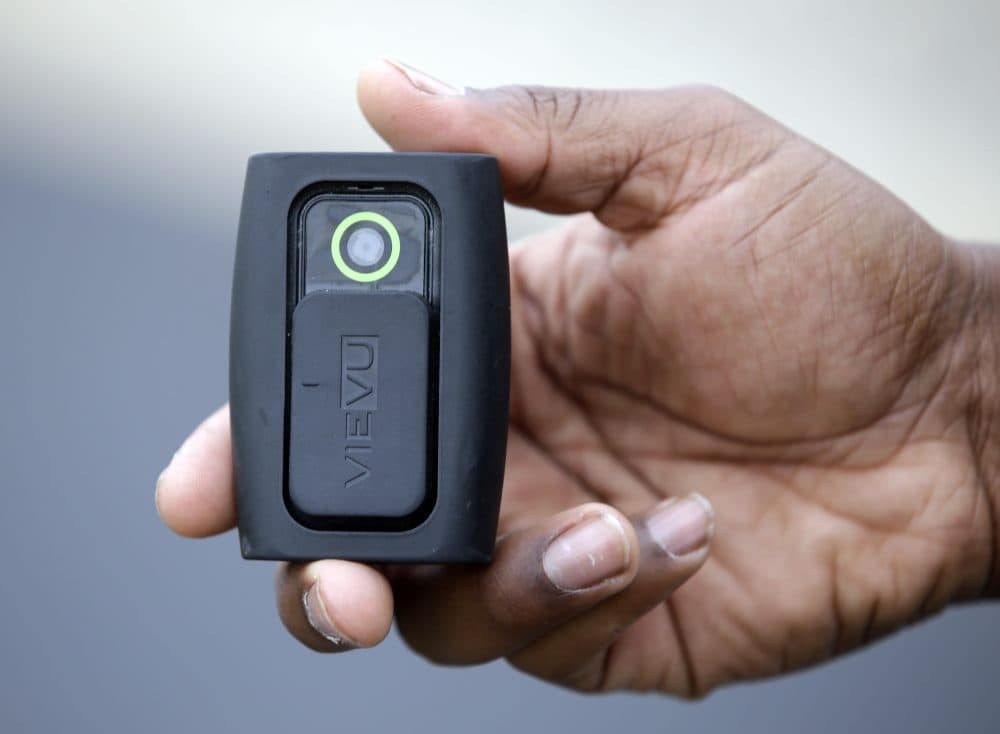Advertisement
Police Commissioner Evans Hopes To Extend Boston's Body Camera Pilot Program

More than halfway through a six-month pilot program, Boston Police Commissioner Bill Evans said he hopes to extend the city's body camera pilot program to better assess how it's working.
Evans gave an update on the pilot program at a public City Council hearing Thursday night at the Mattapan branch of the Boston Public Library.
"All in all, I’d say over the 18 weeks, the pilot program is progressing very well with very little complaints from the officers who are wearing them," Evans said.
One-hundred officers are wearing the cameras as part of the pilot. So far, the department has captured 13,634 videos with a total of 1,905 hours of footage, Evans said. The department averages 108 videos per day and has almost 2 terabytes of data all together.
Evans said he's hoping to extend the pilot in order to gather more data for researchers to analyze the program.
As part of the pilot program, a study is being done on its effectiveness. That study is being led by Dr. Anthony Braga, who heads the School of Criminology and Criminal Justice at Northeastern University, and Jack McDevitt, the director of Northeastern University’s Institute on Race and Justice.
"One of the things we’re measuring are rare events like use of force and that doesn't happen everyday," McDevitt said at Thursday's hearing. "Having a little bit more time allows us to have more faith in our estimates, because there will be more numbers of interactions with citizens, more numbers of times when force might have been used, [and] more time for complaints to be filed."
But Evans said the department hasn't secured all the funding needed for the study.
"So far we have $80,000 and the evaluation is $200,000," Evans said, adding that the evaluation wouldn't be slowed down because of funding.
Evans said he's working with the mayor and Northeastern University to get the full funding.
"Funding is not going to be an issue here, we're going to get the funding," he said.
The city has allotted $500,000 for the pilot program, but Evans said there would have to be a bidding process — which can take time — if those funds are used for the study. So the department is looking for external funding so the study can be done faster. A small amount of the $500,000 has been used for some administrative costs for the pilot, according to the police department.
The pilot is set to end on March 12. Evans said he's unsure yet how long he would extend the program. Any extension would have to be negotiated with the Boston Police Patrolmen's Association, the department's largest union. The union initially tried to delay the pilot program, but a judge ruled the program could move forward in September.
Evans said he's had no complaints from the union over the pilot. He said he hopes to have a decision on extending it in the next two or three weeks.
Patrick Rose, the president of the patrolmen's union, could not immediately be reached for comment Thursday.
In terms of fully implementing body cameras across the force, officials offered no clear timeline but said a determination would be made based on the study, community input and weighing the costs and benefits of the technology.
Several residents spoke out in support of extending the pilot, as well as fully implementing body cameras throughout the department.
"When we sought out to start this program, we were not looking to assess this during the winter and the fall because those are times when crime is down and interactions with officers are less likely to occur as people are in their homes trying to stay warm," said Shekia Scott, the co-organizer of the Boston Police Camera Action Team, a group that has been pushing for body cameras for the last two years.
Scott suggested the pilot should be extended into the summer or spring, when there may be more interactions with police.
Aveann Bridgemohan, a Mattapan resident and member of Black Lives Matter, brought up the fatal South End shooting last fall by police of Terrence Coleman, a man with mental health issues.
"The reason why we have these body cams is we believe we can’t trust the police," Brighmohan said. "In the case of Terrence Coleman, if there was a body cam, would that have de-escalated the situation? This is a question that the community has been asking over and over again."
There are varying accounts over the circumstances of the shooting. Police said Coleman was shot after he lunged at them with a knife. Coleman's mother said he was unarmed. None of the officers involved had body cameras.
Evans did not comment on that specific incident Thursday.
Earlier in the hearing, Evans said the cameras have helped de-escalate some tense incidents and have "shown how difficult our job is."
There have been some technical issues with the cameras not working properly and not staying on the officers — sometimes due to scuffles with individuals, Evans said.
Officials said they have not received any complaints about privacy and have not received any requests from individuals who have had an encounter with an officer wearing a body camera.
